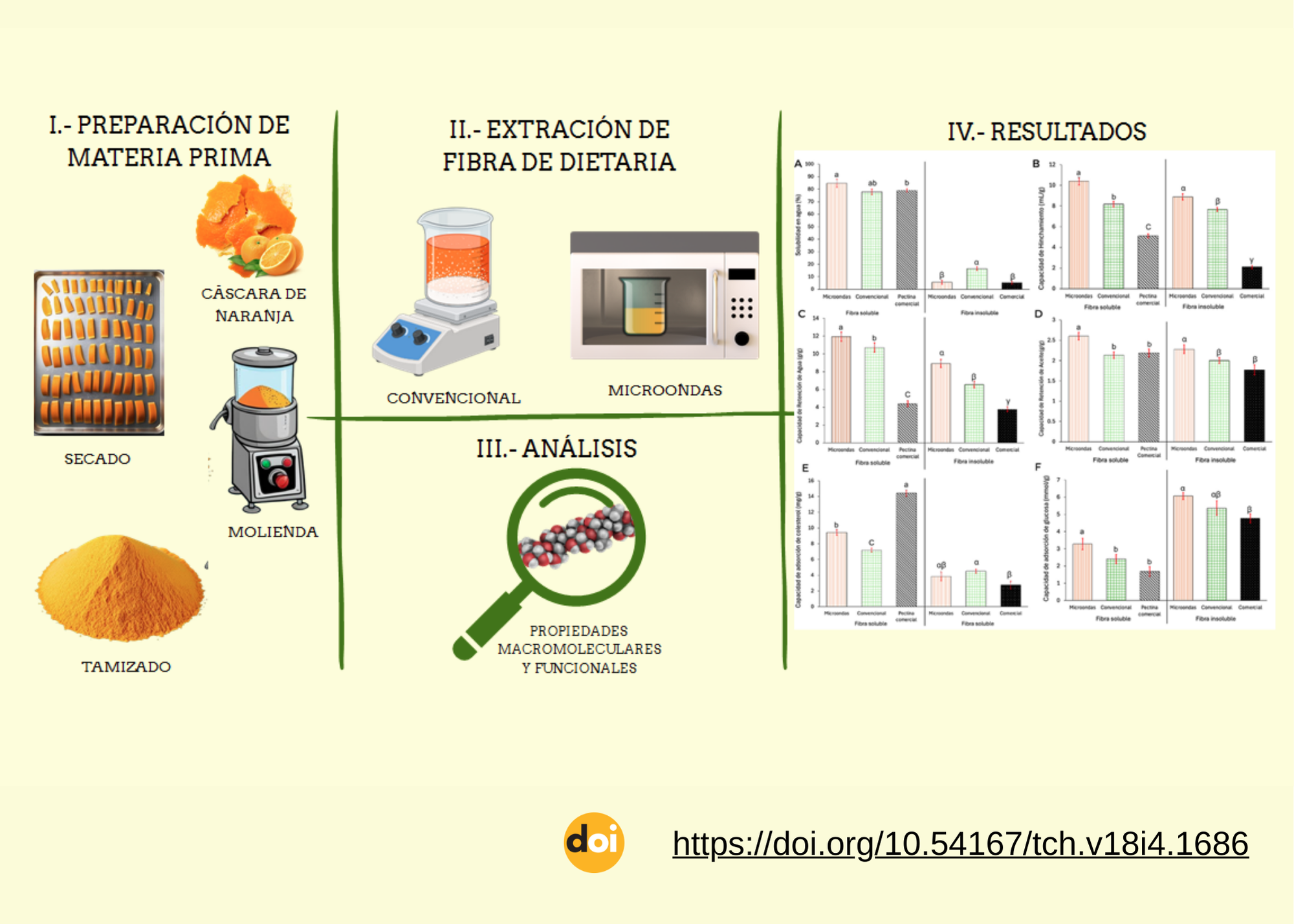Extracción de fibra dietaria de cáscara de naranja mediante microondas y método convencional: Propiedades macromoleculares y funcionales
DOI:
https://doi.org/10.54167/tch.v18i4.1686Palabras clave:
fibra dietaria, microondas, propiedad funcional, extracción, cáscara de naranjaResumen
La fibra dietaria (FD) es un conjunto de polímeros de carbohidratos esenciales para la salud humana presentes en alimentos de origen vegetal. Su consumo mejora el tránsito intestinal y puede contribuir a reducir los niveles de glucosa y colesterol en la sangre. El objetivo de este estudio fue comparar las propiedades macromoleculares y funcionales de la fibra dietaria soluble (FDS) e insoluble (FDI) extraída de la cáscara de naranja por dos métodos: el método ácido convencional y el método asistido por microondas, y compararla con fibra comercial. Los resultados mostraron que la extracción asistida por microondas mejoró significativamente el rendimiento de la FDS, logrando 24.33 ± 0.75 g/ 100 g, en comparación con 14.83 ± 0.73 g/100 g obtenido mediante el método ácido convencional. En cuanto a la FDI, no se encontraron diferencias significativas. Con ambos métodos de extracción, la FD presentó características macromoleculares propias. Con el uso de microondas la fibra presentó mejores propiedades funcionales, como la capacidad de hinchamiento, retención de agua, retención de aceite, y adsorción de colesterol y glucosa. En conclusión, el uso de microondas es un método más eficiente para obtener fibra dietaria de calidad, surgiendo como una alternativa para el aprovechamiento de la cáscara de naranja.
DOI: https://doi.org/10.54167/tch.v18i4.1686
Descargas
Citas
AOAC. (2005). Official methods of analysis. Washington, DC: Association of Official Analytical Chemists.
Arayici, M. E., Mert-Ozupek, N., Yalcin, F., Basbinar, Y., & Ellidokuz, H. (2022). Soluble and insoluble dietary fiber consumption and colorectal cancer risk: A systematic review and meta-analysis. Nutrition and Cancer 74(7):2412-2425. https://doi.org/10.1080/01635581.2021.2008990
Ayala, J. R., Montero, G., Coronado, M. A., García, C., Curiel-Alvarez, M. A., León, J. A., Sagaste, C. A., et al. (2021). Characterization of orange peel waste and valorization to obtain reducing sugars. Molecules 26(5):1348. http://dx.doi.org/10.3390/molecules26051348
Bai, X., He, Y., Quan, B., Xia, T., Zhang, X., Wang, Y., Zheng, Y., & Wang, M. (2022). Physicochemical properties, structure, and ameliorative effects of insoluble dietary fiber from tea on slow transit constipation. Food Chemistry: X 14:100340. https://doi.org/10.1016/j.fochx.2022.100340
Baskaya-Sezer, D. (2023). The characteristics of microwave-treated insoluble and soluble dietary fibers from grape and their effects on bread quality. Food Science & Nutrition 11(12): 7877-7886. https://doi.org/10.1002%2Ffsn3.3705
Benassi, L., Alessandri, I., & Vassalini, I. (2021). Assessing green methods for pectin extraction from waste orange peels. Molecules 26(6):1766. https://doi.org/10.3390/molecules26061766
De Lourdes, García-Magaña, M., García, H. S., Bello-Pérez, L. A., Sáyago-Ayerdi, S. G., & Mata-Montes de Oca, M. (2013). Functional properties and dietary fiber characterization of mango processing by-products (Mangifera indica L., cv Ataulfo and Tommy Atkins). Plant Foods for Human Nutrition 68:254–258. https://doi.org/10.1007/s11130-013-0364-y
Dong, W., Wang, D., Hu, R., Long, Y., & Lv, L. (2020). Chemical composition, structural and functional properties of soluble dietary fiber obtained from coffee peel using different extraction methods. Food Research International 136:109497. https://doi.org/10.1016/j.foodres.2020.109497
Emran, T. B., Islam, F., Mitra, S., Paul, S., Nath, N., Khan, Z., Das, R., Chandran, D., Sharma, R., Lima, C. M. G., Awadh, A. A. A., Almazni, I. A., Alhasaniah, A. H., & Guiné, R. P. F. (2022). Pectin: A bioactive food polysaccharide with cancer preventive potential. Molecules 27(21):7405. https://doi.org/10.3390/molecules27217405
Gan, J., Huang, Z., Yu, Q., Peng, G., Chen, Y., Xie, J., Nie, S., & Xie, M. (2020). Microwave assisted extraction with three modifications on structural and functional properties of soluble dietary fibers from grapefruit peel. Food Hydrocolloids 101:105549. http://dx.doi.org/10.1016/j.foodhyd.2019.105549
Guan, Z. W., Yu, E. Z., & Feng, Q. (2021). Soluble dietary fiber, one of the most important nutrients for the gut microbiota. Molecules 26(22): 6802. https://doi.org/10.3390/molecules26226802
Guo, Y., Liu, W., Wu, B., Wu, P., Duan, Y., Yang, Q., & Ma, H. (2018). Modification of garlic skin dietary fiber with twin-screw extrusion process and in vivo evaluation of Pb binding. Food Chemistry 268:550-557. https://doi.org/10.1016/j.foodchem.2018.06.047
Grigelmo-Miguel, N., & Martín-Belloso, O. (1998). Characterization of dietary fiber from orange juice extraction. Food Research International 31(5):355-361. https://doi.org/10.1016/S0963-9969(98)00087-8
He, Y., Wang, B., Wen, L., Wang, F., Yu, H., Chen, D., Su, X., & Zhang, C. (2022). Effects of dietary fiber on human health. Food Science and Human Wellness 11(1): 1-10. https://doi.org/10.1016/j.fshw.2021.07.001
Huang, J. Y., Liao, J. S., Qi, J. R., Jiang, W. X., & Yang, X. Q. (2021). Structural and physicochemical properties of pectin-rich dietary fiber prepared from citrus peel. Food Hydrocolloids 110:106140. http://dx.doi.org/10.1016/j.foodhyd.2020.106140
Khanpit, V. V., Tajane, S. P., & Mandavgane, S. A. (2023). Orange waste peel to high value soluble dietary fiber concentrate: Comparison of conversion methods and their environmental impact. Biomass Conversion and Biorefinery 13(7):14413–14423. https://doi.org/10.1007/s13399-022-02481-6
Kratchanova, M., Pavlova, E., & Panchev, I. (2004). The effect of microwave heating of fresh orange peels on the fruit tissue and quality of extracted pectin. Carbohydrate Polymers 56(2): 181-185. https://doi.org/10.1016/j.carbpol.2004.01.009
Kute, A. B., Mohapatra, D., Kotwaliwale, N., Giri, S. K., & Sawant, B.P. (2020). Characterization of pectin extracted from orange peel powder using microwave-assisted and acid extraction methods. Agricultural Research 9:241–248. https://doi.org/10.1007/s40003-019-00419-5
Li, Y., Niu, L., Guo, Q., Shi, L., Deng, X., Liu, X., & Xiao, C. (2022). Effects of fermentation with lactic bacteria on the structural characteristics and physicochemical and functional properties of soluble dietary fiber from prosomillet bran. LWT 154:105081. https://doi.org/10.1016/j.lwt.2021.112609
Liu, H., Liang, J., Liang, C., Liang, G., Lai, J., Zhang, R., Wang, Q., & Xiao, G. (2022). Propiedades fisicoquímicas de la fibra dietética de la bergamota y su efecto en ratones diabéticos. Nutrients Frontiers 9:1040825. https://doi.org/10.3389/fnut.2022.1040825
Ma, M. M., & Mu, T. H. (2016). Effects of extraction methods and particle size distribution on the structural, physicochemical, and functional properties of dietary fiber from deoiled cumin. Food Chemistry 194:237–246. https://doi.org/10.1016/j.foodchem.2015.07.095
Ma, R., Chen, J. N., Zhou, X. J., Lin, H., Gao, Q., Peng, X., Tanokura, M., & Xue, Y. L. (2021). Effect of chemical and enzymatic modifications on the structural and physicochemical properties of dietary fiber from purple turnip (Brassica rapa L.). LWT 145: 111313. https://doi.org/10.1016/j.lwt.2021.111313
Martínez-Jiménez, A., García-Salazar, J. A., García-de los Santos, G., Ramírez-Valverde, G., Mora-Flores, J. S., & Matus-Gardea, J. A. (2020). Control of orange supply in Mexico as a mechanism to control price volatility. Revista Fitotecnia Mexicana 43(2): 223-231. https://doi.org/10.35196/rfm.2020.2.223
Núñez-Gómez, V., San Mateo, M., González-Barrio, R., & Periago, M. J. (2024). Chemical Composition, Functional and Antioxidant Properties of Dietary Fibre Extracted from Lemon Peel after Enzymatic Treatment. Molecules, 29(1): 269. https://doi.org/10.3390/molecules29010269
Qiao, H., Shao, H., Zheng, X., Liu, J., Liu, J., Huang, J., Zhang, C., Liu, Z., Wang, J., & Guan, W. (2021). Modification of sweet potato (Ipomoea batatas Lam.) residues soluble dietary fiber following twin-screw extrusion. Food Chemistry 335:127522. https://doi.org/10.1016/j.foodchem.2020.127522
Reynolds, A. N., Akerman, A. P., & Mann, J. (2020). Dietary fibre and whole grains in diabetes management: Systematic review and meta-analyses. PLoS Medicine 17(3): e1003053. https://doi.org/10.1371/journal.pmed.1003053
Sang, J., Li, L., Wen, J., Gu, Q., Wu, J., Yu, Y., Xu, Y., Fu, M., & Lin, X. (2021). Evaluation of the structural, physicochemical, and functional properties of dietary fiber extracted from Newhall navel orange by-products. Foods 10(11): 2772. https://doi.org/10.3390/foods10112772
Soleimanian, Y., Sanou, I., Turgeon, S. L., Canizares, R. M., & Elmasry, M. (2022). Natural plant fibers obtained from agricultural residue used as an ingredient in food matrixes or packaging materials: A review. Compr Rev Food Sc Food Saf 21(1): 371-415. https://doi.org/10.1111/1541-4337.12875
Tan, X., Cheng, X., Ma, B., Cui, F., Wang, D., Shen, R., L,i X., & Li, J. (2024). Characterization and Function Analysis of Soluble Dietary Fiber Obtained from Radish Pomace by Different Extraction Methods. Molecules 29(2): 500. https://doi.org/10.3390%2Fmolecules29020500
Tejada-Ortigoza, V., Garcia-Amezquita, L.E., Serna-Saldívar, S.O., & Welti-Chanes, J. (2016). Advances in the functional characterization and extraction processes of dietary fiber. Food Engineering Reviews 8: 251–271. https://doi.org/10.1007/s12393-015-9134-y
Wang, K., Li, M., Wang, Y., Liu, Z., & Ni, Y. (2021). Effects of extraction methods on the structural characteristics and functional properties of dietary fiber extracted from kiwifruit (Actinidia deliciosa). Food Hydrocolloids 110:106162. https://doi.org/10.1016/j.foodhyd.2020.106162
Wang, S., Chen, F., Wu, J., Wang, Z., Liao, X., & Hu, X. (2007). Optimization of pectin extraction assisted by microwave from apple pomace using response surface methodology. Journal of Food Engineering 78(2):693-700. https://doi.org/10.1016/j.jfoodeng.2005.11.008
Wang, S., Fang, Y., Xu, Y., Zhu, B., Piao, J., Zhu, L., Yao, L., Liu, K., Wang, S., Zhang, Q., Qin, L., & Wu, J. (2022). The effects of different extraction methods on physicochemical, functional, and physiological properties of soluble and insoluble dietary fiber from Rubus chingii Hu. fruits. Journal of Functional Foods 93:105081. https://doi.org/10.1016/j.jff.2022.105081
Welti-Chanes, J., Serna-Saldivar, S., Campanella, O., & Tejada-Ortigoza, V. (Eds.). (2020). Science and technology of fibers in food systems. http://dx.doi.org/10.1007/978-3-030-38654-2
Wongkaew, M., Sommano, S. R., Tangpao, T., Rachtanapun, P., & Jantanasakulwong, K. (2020). Mango peel pectin by microwave-assisted extraction and its use as fat replacement in dried Chinese sausage. Foods 9(4): 450. https://doi.org/10.3390/foods9040450
Wu, S., Jia, W., He, H., Yin, J., Xu, H., He, C., Zhang, Q., Peng, Y., & Cheng, R. (2023). A new dietary fiber can enhance satiety and reduce postprandial blood glucose in healthy adults: A randomized crossover trial. Nutrients 15(21): 4569. https://doi.org/10.3390/nu15214569
Yan, J. K., Wu, L. X., Cai, W. D., Xiao, G. S., Duan, Y., & Zhang, H. (2019). Subcritical water extraction-based methods affect the physicochemical and functional properties of soluble dietary fibers from wheat bran. Food Chemistry 298:124987. https://doi.org/10.1016/j.foodchem.2019.124987
Zhang, M., Bai, X., & Zhang, Z. (2011). Extrusion process improves the functionality of soluble dietary fiber in oat bran. Journal of Cereal Science 54(1): 98-103. https://doi.org/10.1016/j.jcs.2011.04.001
Zhou, L., Luo, J., Xie, Q., Huang, L., Shen, D., & Li, G. (2023). Dietary fiber from navel orange peel prepared by enzymatic and ultrasound-assisted deep eutectic solvents: Physicochemical and prebiotic properties. Foods 12(10): 2007. https://doi.org/10.3390/foods12102007

Publicado
Cómo citar
-
Resumen68
-
PDF23
-
HTML0
Número
Sección
Licencia
Derechos de autor 2025 TECNOCIENCIA Chihuahua

Esta obra está bajo una licencia internacional Creative Commons Atribución-NoComercial 4.0.
















